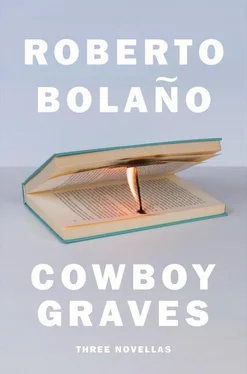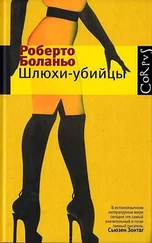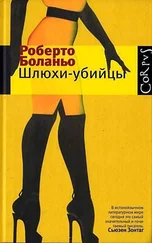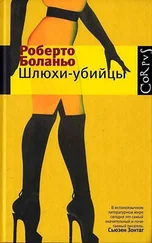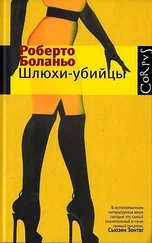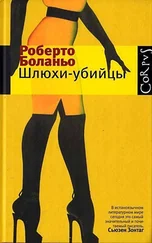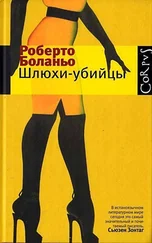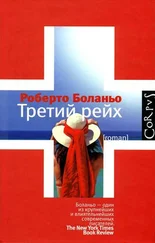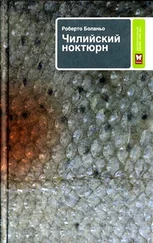I’ve been walking like a lost soul on the lands of your grandfather, may he rest in peace, he said to me once.
We met each morning. Sometimes I tried to pretend I’d forgotten, maybe go back to my solitary walks, my morning movie sessions, but he was always there, sitting on a bench in the Alameda, very still, with the Bali hanging from his lips and his straw hat covering half his forehead (his grub’s forehead). Deep in the shelves of the Librería de Cristal, I couldn’t help seeing him, watching him for a while, and finally going to sit down next to him.
It wasn’t long before I discovered that the Grub was always armed. At first I thought that maybe he was a cop or someone was after him, but it was obvious he wasn’t a cop (or wasn’t a cop anymore) and I’ve never met anyone less concerned about the people around him: he never glanced behind him, never looked to either side, hardly ever looked down. When I asked why he carried a weapon, the Grub replied that it was a habit and I believed him immediately. He wore the pistol on his back, between his spine and his pants. Have you used it many times? I asked him. Yes, many times, he said as if in a dream. For days I was obsessed with the Grub’s gun. It made me uncomfortable to be sitting on a bench in the Alameda talking (or monologizing) to an armed man, not because of what he might do to me, because from the very beginning I knew that the Grub and I would always be friends—but for fear the Mexico City police would spot us, for fear they would frisk us and find the Grub’s gun and the two of us would end up in a cell at the station.
One morning, he got sick and talked to me about Villaviciosa. I spotted him from the Librería de Cristal and he looked the same as usual to me, but when I got close I saw that his shirt was wrinkled as if he’d slept in it, and when I sat down next to him, I noticed that he was shaking uncontrollably. You have a fever, I said, you have to get in bed. Despite his protests, I went with him to the boardinghouse where he lived. Lie down, I said. The Grub took off his shirt, put the pistol under his pillow, and seemed to fall asleep instantly, though with his open eyes fixed on the ceiling. In the room, there was a narrow bed, a night table, a dilapidated wardrobe. In the wardrobe, I saw three perfectly folded white shirts and two pairs of white pants hanging on their respective hangers. Under the bed was a leather briefcase of excellent quality, the kind that has a combination lock like a strongbox. I didn’t see a single newspaper or magazine. The place smelled of disinfectant. Give me money to go to the pharmacy to buy you something, I said. He handed me a roll of bills from his pants pocket and was still again. Every so often a tremor shook him from head to foot as if he was about to die. For a moment, I thought that maybe it would be best to call a doctor, but I realized the Grub wouldn’t like that. When I came back, loaded down with medicine and bottles of Coca-Cola, he had gone to sleep. I gave him a massive dose of antibiotics and some pills to bring his fever down. Then I made him drink half a liter of Coca-Cola. I had also bought him a pancake, which I left on the night table in case he was hungry later. When I was about to go, he opened his eyes and started to talk about Villaviciosa.
In his own peculiar way, he was lavish with detail. He said that the town had sixty houses at most, two bars, a grocery store. He said that the houses were adobe and some yards were paved. He said that the town was two or three thousand years old and its natives made a living as hired killers and bodyguards. He said that a river ran nearby. It was called Río Negro because of the color of its waters, and where it ran past the cemetery, it became a delta that was sucked down into the dry earth. He said that people sometimes spent a long time gazing at the horizon, at the sun setting behind the Lagarto Mountains, and that the horizon was flesh colored, like a dying man’s back. What do they think they’ll see? I asked. I don’t know, he said. Then he said: a cock. And then: wind and dust, maybe. Then he seemed to relax and after a while I decided that he was asleep. I’ll be back tomorrow, I whispered. Take your medicine and stay in bed. The next morning, before stopping by the Grub’s boardinghouse, I spent a while at the Librería de Cristal, as usual. When I was about to go, I saw him through the transparent walls. He was sitting on the same bench, in a clean, loose-fitting white shirt and immaculate white pants, in his straw hat and with a Bali hanging from his lower lip. He was looking straight ahead, as was his habit, and he seemed healthy. That noon, when we parted, he brusquely handed me some bills and said something about the trouble I’d gone to the day before. It was lots of money. I told him he didn’t owe me anything, I would have done the same for any friend. The Grub insisted that I take the money. You can buy some books, he said. I have lots of books, I answered. This way you won’t have to steal books for a few days, he said. At last, I accepted the money. A long time has gone by and I can’t remember how much it was; the Mexican peso has lost value many times. I only remember that it was enough to buy twenty books and two records.
He never talked to me about Villaviciosa again. For a month and a half, maybe two months, we met each morning and parted at noon, when it was time for lunch and I went home on a city bus or a pesero . A few times, I invited him to the movies, but the Grub never wanted to go. He liked to talk to me as we sat in the Alameda or strolled the neighborhood, and sometimes he would deign to enter a bar, where he always sought out a turtle-egg vendor. I never saw him touch alcohol. A few days before he disappeared forever, he got it into his head to make me talk about Jacqueline Andere. I realized it was his way of remembering her. I talked about her ash-blond hair and compared it favorably or unfavorably to her honey-blond hair in the movies and the Grub nodded slightly, staring straight ahead, as if seeing her for the first time. Once I asked him what kind of women he liked. It was a stupid question from a kid just trying to pass the time. But the Grub took it literally and for a long time he pondered his response. At last he said: quiet women. And then he added: but only the dead are quiet. And after a while: not even the dead, when you think about it.
One morning he gave me a knife. The word Caborca was traced in silver on the bone handle. I remember that I thanked him effusively, and that morning, as we were talking in the Alameda or walking the crowded streets, I opened and shut it, admiring the grip, testing its weight in my hand, marveling at its perfect proportions, and frightening some passersby, who stepped away when they saw the knife, assuming an intent to harm that I by no means harbored. Otherwise, it was the same as any other day. The next morning, the Grub was gone.
Two days later, I went looking for him at his boardinghouse and I was told that he had gone north. I never saw him again.
Dora Montes boarded the Donizetti with approximately twenty other passengers, myself among them. The name of the port where we embarked sounded like a joke or gibberish. And maybe it really was gibberish, but it wasn’t a joke in the Spanish sense of the term.
Then came the passage through the locks, with the passengers getting up early so as not to miss a thing (I slept in). And then, during breakfast, I saw her. She was sharing the table next to mine with her secretary, a brusque woman with very long straight hair who always wore black; a Peruvian businessman; and my cabinmate. I, in turn, was sitting with a Spanish Jesuit on his way to Bolivia, who would leave us in El Callao; a Chilean student returning from Europe; and the student’s German wife, who was learning Spanish. I don’t know whose idea it was to put us together. It had nothing to do with where we were from, or where our names fell in the alphabet, or whether our cabins were in the same section. It was just chance, and by lunchtime we discovered that the four of us at my table and the four at the neighboring table got along tolerably well, separately and even together, and any arguments would be civilized and easily settled.
Читать дальше
